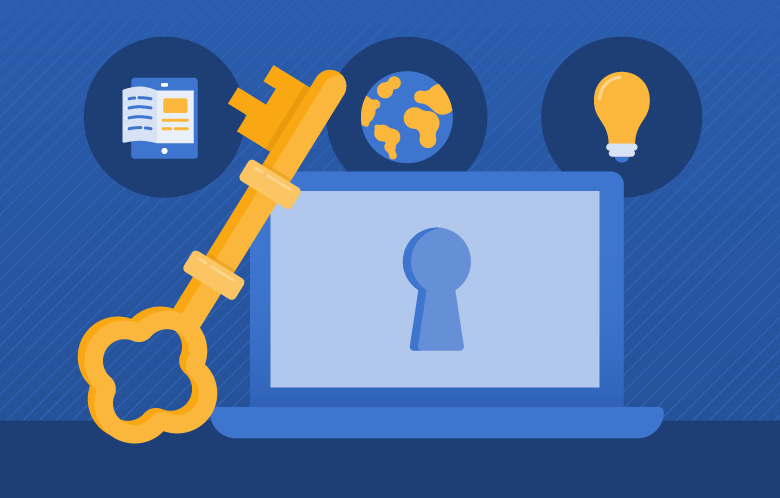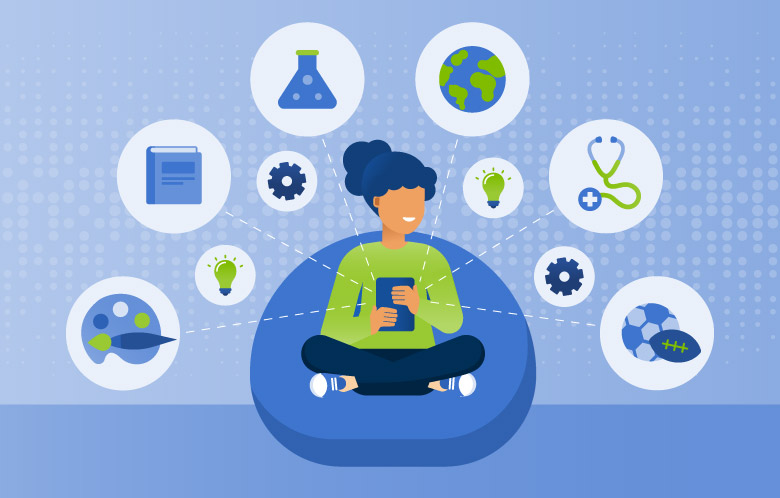As educational trends evolve and expectations rise, high school students are under growing pressure to excel academically, whether they are in general education courses or enrolled in more rigorous programs such as Honors, Advanced Placement (AP) or International Baccalaureate (IB). Library databases play a crucial role in supporting every student’s academic journey by providing access to high-quality resources, developing essential research skills, advancing information literacy and more.
Here are six ways library databases enhance the educational experience for all high school students:
-
Access to Comprehensive Resources
Library databases provide a treasure trove of trustworthy materials, including peer-reviewed articles from popular and scholarly publications, e-books, primary source documents, videos and an array of multimedia content. These resources benefit all students, whether they are researching a topic for a standard history project or diving into more specialized subjects for Honors, AP or IB coursework. The ability to explore diverse viewpoints fosters critical thinking and deepens student learning at every academic level.
-
Customized Learning Paths
Students, regardless of their academic track, often have unique interests and learning goals. Library databases allow for personalized learning experiences, enabling students to tailor their research based on their individual needs, interests and preferences. While an IB student might explore case studies on global issues, a general education student could use the same database to find reliable sources for a research paper or class project. This flexibility empowers all students to engage deeply with the topics that interest them most. Using the Explora interface, students can delve into their chosen subjects with ease and precision, whether they prefer keyword searching or topic browsing.
-
Information Literacy and Research Skills Development
Library databases serve as training grounds for information literacy and research skills development. Learning how to efficiently search for information, evaluate sources and synthesize findings is a vital skill set that extends beyond high school. Whether preparing for college-level research or simply completing a classroom assignment, all students can benefit from mastering research and information literacy skills early on.
-
Academic Integrity and Citation Support
Maintaining academic integrity is crucial for all students. Library databases offer citation tools that make it easy for them to avoid plagiarism and correctly attribute sources in a variety of styles, including APA, MLA and Chicago. Students using EBSCO databases can generate accurate citations by copying and pasting them right from the Cite Tool into their works cited page or by exporting them to bibliographic management software platforms such as NoodleTools. Whether a student is preparing a basic report or an in-depth research paper, these citation tools help ensure that they uphold ethical standards in their academic work.
-
Multilingual Resources and Translation
For students in IB programs or those studying foreign languages, the availability of multilingual resources in library databases is a major asset. However, these resources also benefit students in general education who may need access to global perspectives or non-English materials. Translation tools make it easier for non-native English speakers to engage with database content. EBSCO databases offer users the ability to translate the interface language and translate online full text, broadening the accessibility of rich, reliable resources for a diverse student population.
-
Easing the Transition to College
While students in Honors, AP, and IB programs often use library databases to prepare for college-level work, these tools are equally valuable for students in general education. By learning to navigate the same types of databases used in higher education, all students become familiar with academic research practices. This not only enhances their high school experience but also gives them a head start in developing the skills they’ll need to succeed in college and beyond.
Library databases are more than digital shelves; they are vital resources that support the academic growth of every high school student. Whether navigating the demands of general education or tackling advanced coursework in Honors, AP and IB programs, students can benefit from the rich content and embedded research tools that databases offer. From helping students explore new ideas and perspectives to preparing them for college and careers, library databases are key to unlocking academic success at every level.



